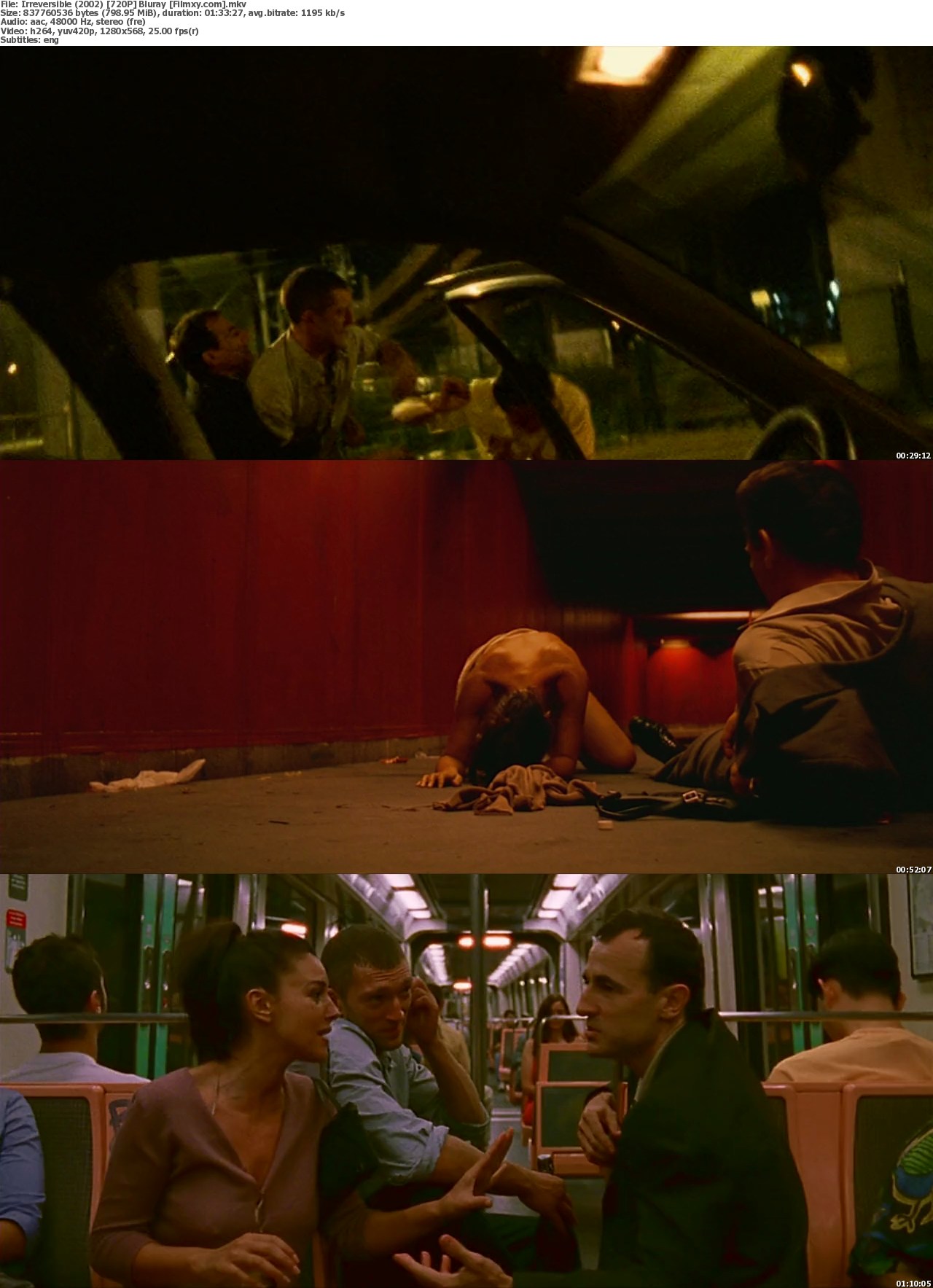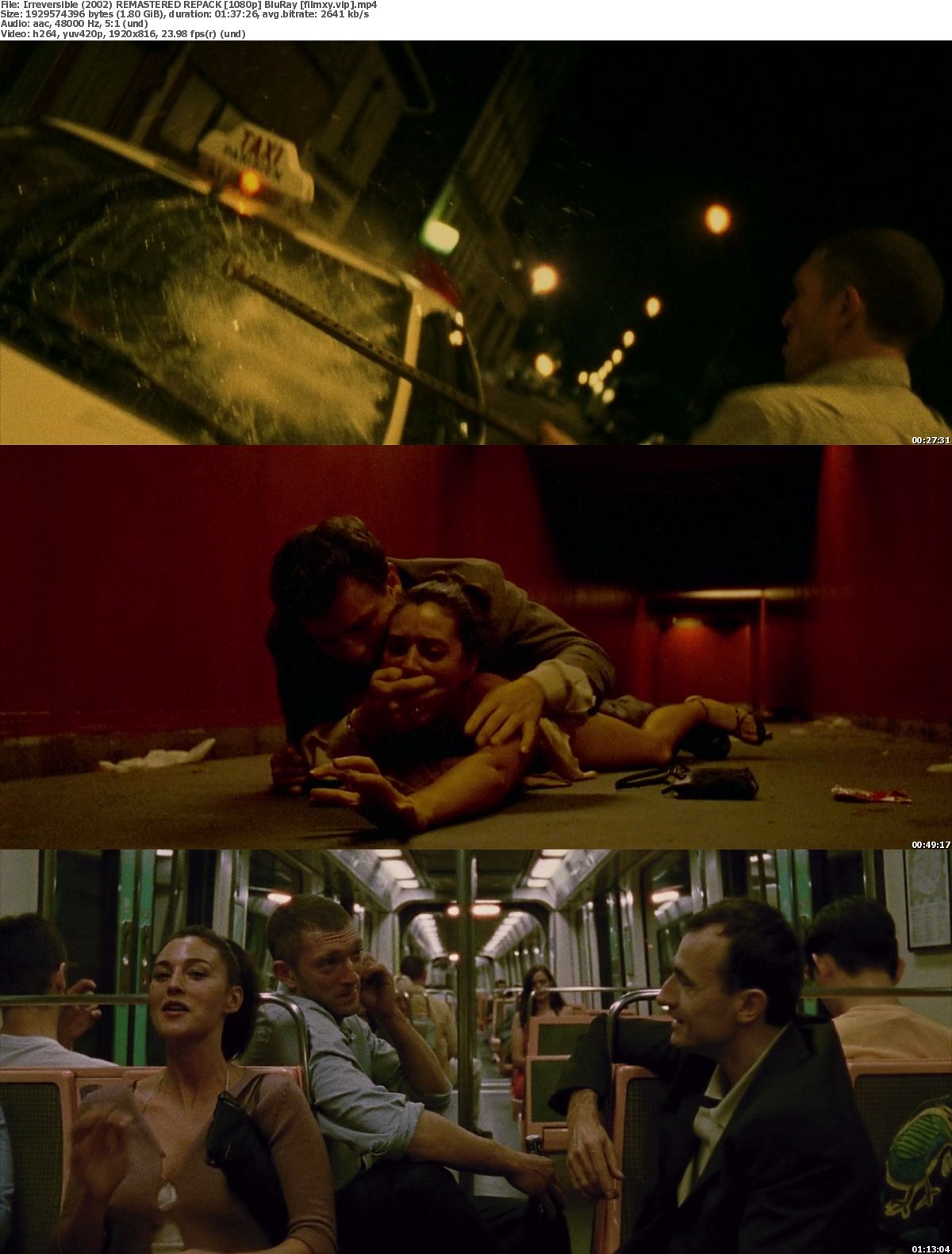Exploring "Irreversible": A Deep Dive Into Gaspar No's Controversial Film
Do you dare to confront the abyss of human depravity? Gaspar No's 2002 film, Irrversible, plunges viewers into a cinematic experience so harrowing, so unflinchingly brutal, that it challenges the very boundaries of what we consider watchable.
A scene from Irrversible, directed by Gaspar No, is etched into the annals of cinema not for its beauty or grace, but for its raw, visceral depiction of violence. The film, a French crime drama, unfolds in reverse chronological order, beginning with the aftermath of a brutal attack and slowly unraveling the events that led to it. This unconventional narrative structure, however, is not the films most striking feature. That distinction belongs to its unflinching portrayal of human cruelty, a depiction that has polarized audiences and critics alike.
The film's structure, moving backward through time, forces the viewer to confront the consequences of the events before fully understanding their genesis. The opening scenes, depicting a brutal act of revenge, are followed by the devastating assault that triggered it, and finally, by the moments leading up to the tragedy. This reverse narrative amplifies the emotional impact, forcing the audience to live with the aftermath before understanding the context.
- Find Movies Streaming Download Options Free Movies Katmoviehd More
- The Junko Furuta Case A Look Back At The Horrific Crime
| Category | Details |
|---|---|
| Film Title | Irrversible (2002) |
| Director | Gaspar No |
| Main Actors | Monica Bellucci, Vincent Cassel, Albert Dupontel, Philippe Nahon |
| Genre | French Crime Drama, Art Thriller |
| Runtime | 94 minutes |
| Notable Features | Reverse chronological order, unflinching depiction of violence, controversial storyline, aesthetic camerawork |
| Key Themes | Violence, revenge, fate, destiny, trauma, the nature of time |
| Controversies | Highly graphic content, including scenes of rape and extreme violence; walkouts at Cannes Film Festival screenings. |
| Awards and Recognition | Nominated for the Palme d'Or at the 2002 Cannes Film Festival. |
| IMDB Rating | 7.3/10 |
| Where to Watch | Availability varies based on region. Check streaming services such as Amazon Prime, or other platforms. |
| Reference Website | IMDB |
The film's depiction of violence is its most controversial element. The rape scene, for example, is a notoriously difficult watch, unfolding in a single, unbroken take and lasting for an extended period. This raw and unadulterated presentation of the attack leaves a profound impact on the viewer, forcing them to confront the brutality head-on. The camera's unflinching gaze intensifies the emotional weight of the scene, leaving the audience feeling uneasy, angry, and desperate.
This is not a film that offers comfort or easy answers. It's a descent into the darkest corners of human behavior, exploring themes of violence, revenge, and the cyclical nature of trauma. The film doesn't shy away from the ugliness of human nature; instead, it confronts it directly, forcing the viewer to grapple with the darkest aspects of reality. The desire for vengeance, presented as a natural impulse, drives much of the narrative, highlighting the film's exploration of the primal instincts that can drive individuals.
One of the reasons the scene has such a strong emotional impact is the placement of the camera, which often becomes a silent, observing entity. This perspective, at times, makes the viewer feel like a complicit observer to the unfolding tragedy, heightening the sense of unease and moral ambiguity. The film's aesthetic choices, including the use of strobe lighting and disorienting camera movements, further immerse the viewer into the experience, enhancing the sense of disorientation and emotional turmoil.
As American film critic Roger Ebert noted, Irrversible is a movie so violent and cruel that most people will find it unwatchable. The film's unflinching depiction of violence and its reverse chronological structure are not meant for casual viewing; they are a provocation, a challenge to the audience to confront the darkest aspects of human nature. Around 200 people walked out of the screening at Cannes, a testament to the film's capacity to shock and disturb.
The film also doesnt offer easy answers. It presents a world where some acts cannot be undone and where crimes often go unpunished. The final scene, where the audience is taken back to the early moments before the devastating events, offers a poignant and heartbreaking reminder of the tragedy that is about to unfold. The ending, with the flashing strobe lights and the haunting phrase, Time ruins everything, encapsulates the film's overarching theme: the devastating consequences of violence and the fragility of life.
The films success rests on several factors. The performances of the lead actors, particularly Monica Bellucci, Vincent Cassel, and Albert Dupontel, are crucial to the films power. They portray characters caught in a web of violence, their lives irrevocably altered by a single, traumatic night in Paris. The raw emotional depth of the characters is the driving force of the film.
The aesthetic camerawork, as mentioned before, contributes significantly to the film's impact. The disorienting camera movements and the use of long takes serve to disorient the viewer, immersing them in the characters' experience. The visual style reinforces the film's themes of violence, chaos, and the instability of reality.
The film's exploration of fate and destiny pushes the boundaries of human emotion. The reverse chronology highlights the predetermined nature of the events, suggesting that the characters are merely puppets of fate. This element further emphasizes the bleak and pessimistic tone of the film, leaving the audience with a lingering sense of despair.
The film's unflinching depiction of violence and its willingness to push the boundaries of cinematic expression make it a divisive work. Some critics and viewers have condemned the film as exploitative and gratuitous, while others have praised it for its artistic merit and its unflinching exploration of human nature. Irrversible is a film that demands attention, forcing viewers to grapple with its challenging themes and its brutal realism.
The movie is known for its controversial storyline and unflinching visual depiction of violence and rape. It explores the consequences of violence, the desire for revenge, and the destructive nature of human behavior. The films exploration of the cyclical nature of trauma and its depiction of the lasting impact of violence make it a work that lingers in the mind long after the credits roll.
The film's setting in Paris, a city often associated with romance and beauty, provides a stark contrast to the violence that unfolds. This contrast further underscores the film's exploration of the darker aspects of human nature. The juxtaposition of beauty and brutality serves to heighten the emotional impact of the film, creating a sense of unease and moral ambiguity.
The film's reverse chronology also adds a layer of complexity to the narrative, forcing the viewer to piece together the events in a non-linear fashion. This approach challenges the conventional cinematic structure, making the experience more immersive and engaging. The unconventional narrative structure creates an unsettling effect, forcing the viewer to confront the consequences of the events before fully understanding the context.
The scene of violence is really difficult to watch, it is not meant to be easy. Its a stark reminder of the brutality that exists in the world, it's not designed to be pleasant. The film's unflinching gaze serves as a mirror, reflecting the darkest aspects of human nature, forcing the viewer to confront the uncomfortable truths about violence and its devastating impact.
The film's unflinching depiction of violence and its willingness to push the boundaries of cinematic expression have made it a landmark film in the history of cinema. It is a film that challenges the audience, demanding that they confront the darkest aspects of human nature. Irrversible remains a deeply unsettling, yet profoundly affecting, cinematic experience.
The film's exploration of the nature of time is another key element. The reverse chronology underscores the idea that time cannot be reversed and that the consequences of our actions are irreversible. The haunting phrase, "Time ruins everything," that bookends the film serves as a stark reminder of this fundamental truth. The film leaves the audience with a sense of sadness.
The final piece of the puzzle reveals that Alex was pregnant. This devastating truth adds another layer of tragedy to the narrative, highlighting the loss of innocence and the destruction of potential. This discovery further emphasizes the themes of loss and devastation that run throughout the film.
Irrversible, ultimately, is a film that confronts the viewer with the darkest aspects of human nature, challenging our perceptions of violence, revenge, and the nature of time. Whether viewed as a work of art or a cinematic provocation, it is a film that stays with you long after the credits roll. It does not provide solace, but it does offer a raw, unflinching glimpse into the abyss.
- Explore The Mafia Nanny Webtoon Romance Amp Crime Thriller
- Crazyjamjam Nudes Leaks Latest Photos Videos Explore Now

'Irreversible' by Gaspar Noé. (2002) Cine epico, Cine, Gaspar noe

Nonton Film Irreversible (2002) GudangMovies21

Nonton Film Irreversible (2002) GudangMovies21